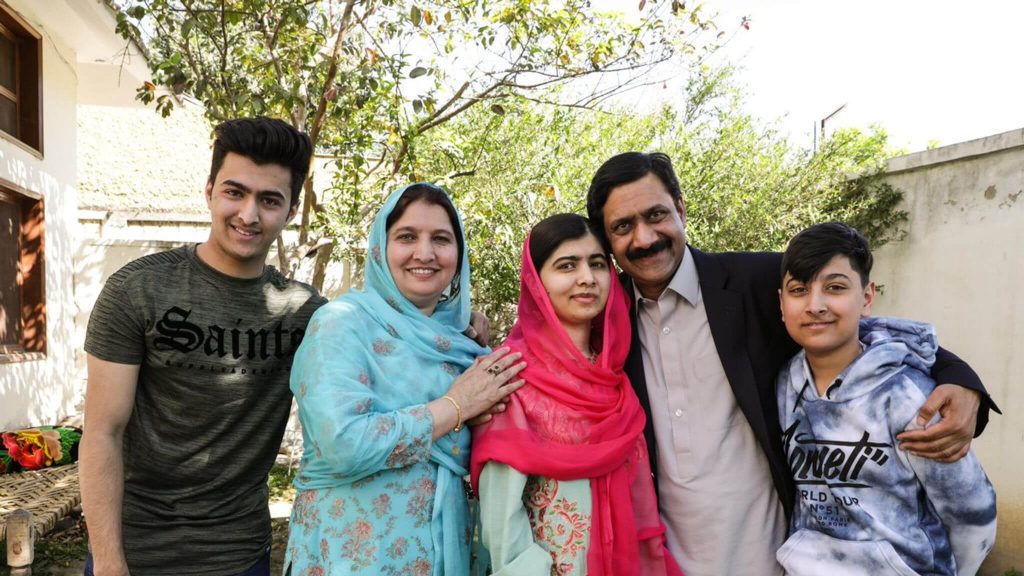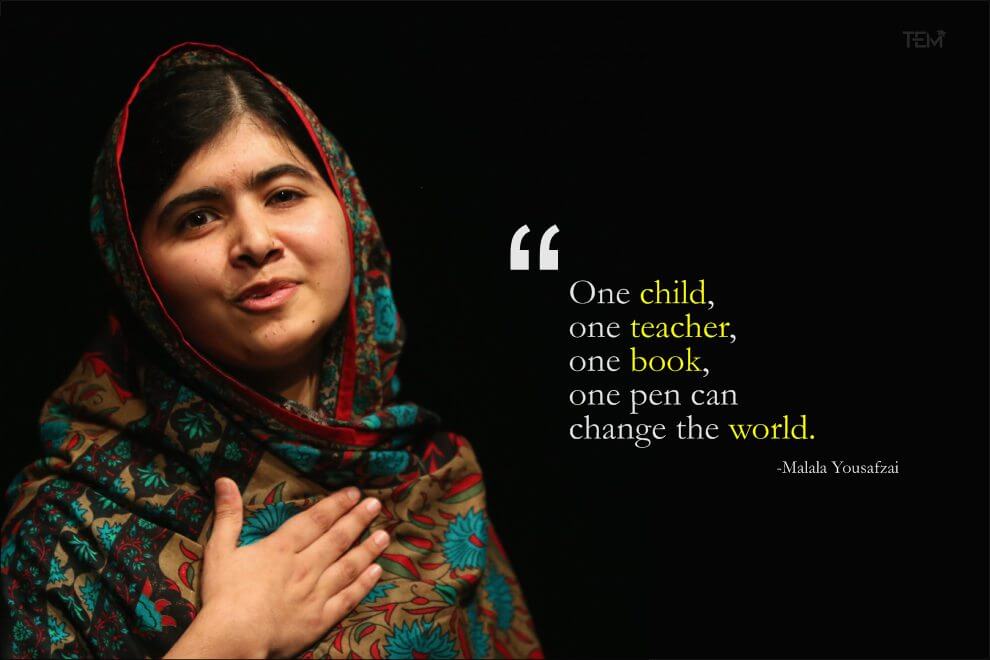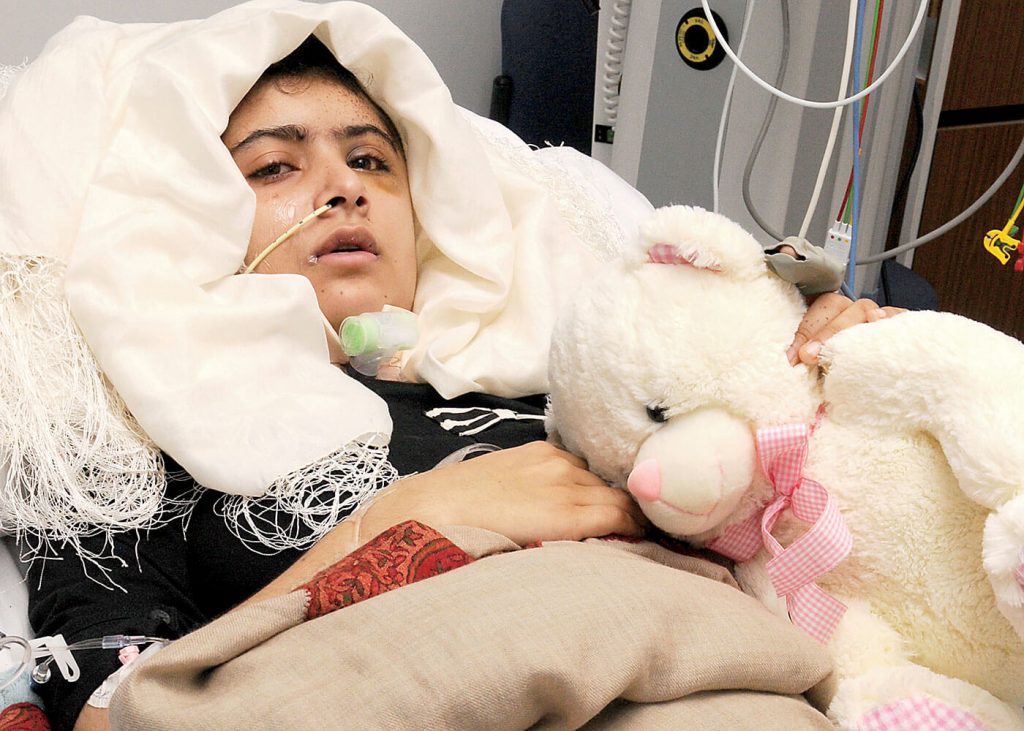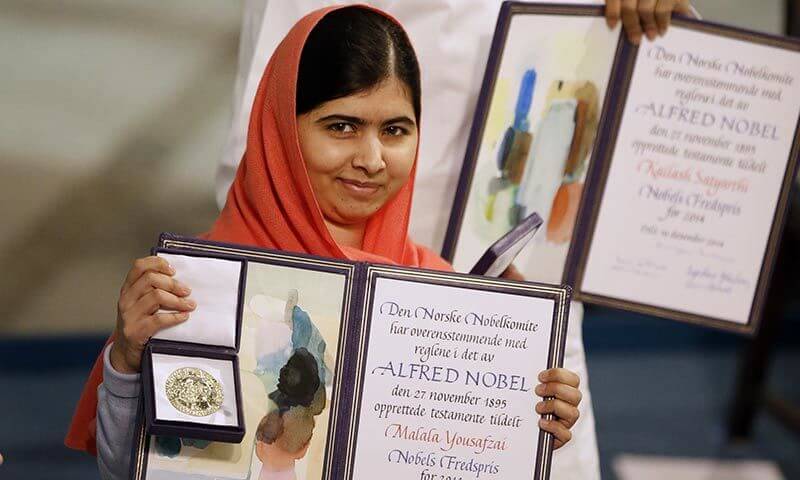
Early life
Yousafzai was born on 12 July 1997 in the Swat District of Pakistan’s northwestern Khyber Pakhtunkhwa province, into a lower-middle-class family. She is the daughter of Ziauddin Yousafzai and Tor Pekai Yousafzai. Her family is Sunni Muslim of Pashtun ethnicity, belonging to the Yusufzai tribe. The family did not have enough money for a hospital birth and as a result, Yousafzai was born at home with the help of neighbours. She was given her first name Malala (meaning “grief-stricken”) after Malalai of Maiwand, a famous Pashtun poet and warrior woman from southern Afghanistan. At her house in Mingora, she lived with her two younger brothers, Khushal and Atal, her parents, Ziauddin and Tor Pekai, and two chickens.
Fluent in Pashto, Urdu and English, Yousafzai was educated mostly by her father, Ziauddin Yousafzai, who is a poet, school owner, and an educational activist himself, running a chain of private schools known as the Khushal Public School. In an interview, Yousafzai once stated that she aspired to become a doctor, though later her father encouraged her to become a politician instead. Ziauddin referred to his daughter as something entirely special, allowing her to stay up at night and talk about politics after her two brothers had been sent to bed.
Inspired by the founder of Pakistan, Muhammad Ali Jinnah and the twice-elected Prime Minister Benazir Bhutto, Yousafzai started speaking about education rights as early as September 2008, when her father took her to Peshawar to speak at the local press club. “How dare the Taliban take away my basic right to education?” Yousafzai asked her audience in a speech covered by newspapers and television channels throughout the region. In 2009, Yousafzai began as a trainee and then a peer educator in the Institute for War and Peace Reporting’s Open Minds Pakistan youth programme, which worked in schools in the region to help young people engage in constructive discussion on social issues through the tools of journalism, public debate and dialogue.

Education Activist
Yousafzai attended a school that her father, educator Ziauddin Yousafzai, had founded. After the Taliban began attacking girls’ schools in Swat, Yousafzai gave a speech in Peshawar, Pakistan, in September 2008. The title of her talk was, “How dare the Taliban take away my basic right to education?”
In early 2009, when she was just 11 years old, Yousafzai began blogging for the BBC about living under the Taliban’s threats to deny her an education. In order to hide her identity, she used the name Gul Makai. However, she was revealed to be the BBC blogger in December of that year.
With a growing public platform, Yousafzai continued to speak out about her right, and the right of all women, to an education. Her activism resulted in a nomination for the International Children’s Peace Prize in 2011. That same year, she was awarded Pakistan’s National Youth Peace Prize.
Yousafzai and her family learned that the Taliban had issued a death threat against her because of her activism. Though Yousafzai was frightened for the safety of her father — an anti-Taliban activist — she and her family initially felt that the fundamentalist group would not actually harm a child.

Shot by the Taliban
On October 9, 2012, when 15-year-old Yousafzai was riding a bus with friends on their way home from school, a masked gunman boarded the bus and demanded to know which girl was Yousafzai. When her friends looked toward Yousafzai, her location was given away. The gunman fired at her, hitting Malala in the left side of her head; the bullet then traveled down her neck. Two other girls were also injured in the attack.
The shooting left Yousafzai in critical condition, so she was flown to a military hospital in Peshawar. A portion of her skull was removed to treat her swelling brain. To receive further care, she was transferred to Birmingham, England.
Once she was in the United Kingdom, Yousafzai was taken out of a medically induced coma. Though she would require multiple surgeries—including repair of a facial nerve to fix the paralyzed left side of her face — she had suffered no major brain damage. In March 2013, she was able to begin attending school in Birmingham.
The shooting resulted in a massive outpouring of support for Yousafzai, which continued during her recovery. Unfortunately, the Taliban still considers Yousafzai a target, although Yousafzai remains a staunch advocate for the power of education.

Speech at the U.N.
Nine months after being shot by the Taliban, Yousafzai gave a speech at the United Nations on her 16th birthday in 2013. Yousafzai highlighted her focus on education and women’s rights, urging world leaders to change their policies.
Following the attack, Yousafzai said that “the terrorists thought that they would change our aims and stop our ambitions, but nothing changed in my life except this: weakness, fear and hopelessness died. Strength, power and courage were born.”

Awards
In October 2013, the European Parliament awarded Yousafzai the Sakharov Prize for Freedom of Thought in acknowledgment of her work. In October 2014, Yousafzai became the youngest person to receive the Nobel Peace Prize, at just 17 years old; she received the award along with Indian children’s rights activist Kailash Satyarthi.